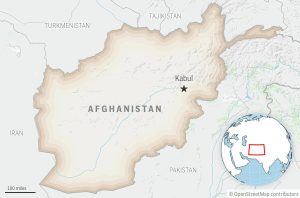ISLAMABAD (AP) — The Taliban government on Friday blamed Pakistan for striking the Afghan capital and bombing a market in the country’s east, accusing its neighbor of violating national airspace.
A blast struck before 10 p.m. local time on Thursday in the Abdul Haq Square area of Kabul, close to several ministries and the national intelligence agency. Security forces sealed off the site.
The government’s chief spokesman, Zabihullah Mujahid, said at the time that there were no reports of injuries or damage. He described the explosion as an accident and said an investigation was underway.
But Afghanistan’s Defense Ministry said Friday that Pakistan was responsible for that attack and for another, in the eastern province of Paktika.
Afghan’s Defense Ministry didn’t say what the source of the bombing was or how Pakistan was able to carry out a strike in an urban center without being shot down.
Pakistan has, in the past, launched strikes inside Afghan territory to target what it says are militant hideouts and installations.
Pakistani Army spokesman Ahmad Sharif was asked at a news conference Friday if the military had attacked Afghanistan to target leaders of the banned Pakistani Taliban group. Sharif didn’t give a direct answer to the question.
“Afghanistan is being used as a base of operations against Pakistan, and there is proof and evidence of that,” Sharif said at the news conference in the northwestern city of Peshawar. “The necessary measures that should be taken to protect the lives and property of the people of Pakistan will be taken and will continue to be taken.”
Pakistan has seen a surge in violence in recent years, mostly claimed by the Pakistani Taliban. The group is separate from but allied with the Afghan Taliban.
Pakistani Taliban leaders and fighters are believed to operate from across the border in Afghanistan, something that the Afghan Taliban deny.
The Afghan Defense Ministry called the recent pair of strikes “unprecedented, violent and heinous.”
It warned that the Pakistani army would face the consequences if the situation became worse. The statement didn’t include information on the alleged targets, casualties or damage.
The Armed Conflict Location & Event Data Project monitoring group said that it was unclear who was responsible for the Kabul strike or what the source was. But, if confirmed, it would be the first in the Afghan capital since the U.S. one in 2022 that killed al-Qaida leader Ayman al-Zawahiri.
Pearl Pandya, a senior analyst with the group, said that Pakistan had increased its use of airstrikes within Afghan territory this year, targeting alleged Pakistani Taliban hideouts.
“These alleged strikes coincide with the Taliban’s first diplomatic trip to India since they returned to power in 2021,” Pandya said. “An improvement in relations between India and Afghanistan is likely to be resented by Islamabad, fearful of any potential destabilizing impact on its western borders.”

